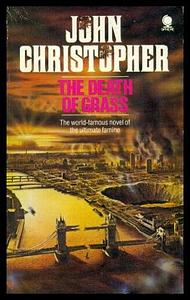Take a photo of a barcode or cover
2009 bookcrossing journal:
Finished this one already. It was compelling reading, and once I'd gotten going with it I couldn't really stop until it was finished. Not the most cheerful of subject matters, but really interesting. It's set in the 50s, so it's a little dated in some ways, in reference to technology etc that is mentioned in the book; but human behaviour is the same, and with society turned on it's head, it doesn't matter that it's set in the 50s, as it's all a return to caveman principles.
The death of grass is about a grass virus, Chung-Li, that kills all grasses - so we're talking rice, wheat, oats, corn etc etc. It starts off in Asia and spreads across the world. And as the grasses die, livestock can't be fed and nations starve to death.
This book is set in Britain, focussing on a couple of well to do London families. At the start this problem of starvation is just in Asia, and whilst the women are concerned about the sadness of the world, life continues as normal, holidays etc; people making comments that if such a thing ever happened in the UK, the civilised nature of the Englishman would ensure that things were dealt with in a proper way. And why do we get the feeling someone's going to end up eating those words?
Food stocks in Britain - a country already importing a lot of food - dry up; rumours start national panic and the country falls into anarchy. Our two families decide to move up to the north of England where one of the men's brother has a farm and they think they can go and live peaceful and well-fed lives. On the way, even they find themselves doing things they would not have thought possible. There is murder of all kinds, looting, rape etc etc. It is kind of disturbing to see how quickly people change and how ruthless they become. Which leaves you questioning, if you were in that situation, would you be the same? I don't always know whether the killings were always necessary. But these two families and hangers on never seen to realise that they are the invaders, taking what is not theirs. A lot of this takes place up in Yorkshire, and you see them killing people to get food, for defence, and getting angry when they are not allowed passage - as if they have a right, even more than a right, than the people who live there. Every man for himself, I suppose, which is what this book shows. But as this virus is almost like a punishment for having used and abused the world's resources; so people continue in this mindset: where I live, I will die, so I shall go elsewhere and kill the people there to get what I want. And it all ultimately ends in destruction and tragic endings.
I come from North Yorkshire, so I know these areas: the vale of York and the Dales, really well. So I could imagine these settings really well - that road going into Masham; Coverdale etc etc; so that all brings another level of realism to it all as well.
On some levels, the characters do end up being quite unlikeable, which softens the blow for the not-unexpected unhappy endings of sorts. But it is quite scary to imagine the implications of these kinds of environmental disasters and what they might mean for the world. I suppose it's plausible that something like this could happen, given the right circumstances.
Finished this one already. It was compelling reading, and once I'd gotten going with it I couldn't really stop until it was finished. Not the most cheerful of subject matters, but really interesting. It's set in the 50s, so it's a little dated in some ways, in reference to technology etc that is mentioned in the book; but human behaviour is the same, and with society turned on it's head, it doesn't matter that it's set in the 50s, as it's all a return to caveman principles.
The death of grass is about a grass virus, Chung-Li, that kills all grasses - so we're talking rice, wheat, oats, corn etc etc. It starts off in Asia and spreads across the world. And as the grasses die, livestock can't be fed and nations starve to death.
This book is set in Britain, focussing on a couple of well to do London families. At the start this problem of starvation is just in Asia, and whilst the women are concerned about the sadness of the world, life continues as normal, holidays etc; people making comments that if such a thing ever happened in the UK, the civilised nature of the Englishman would ensure that things were dealt with in a proper way. And why do we get the feeling someone's going to end up eating those words?
Food stocks in Britain - a country already importing a lot of food - dry up; rumours start national panic and the country falls into anarchy. Our two families decide to move up to the north of England where one of the men's brother has a farm and they think they can go and live peaceful and well-fed lives. On the way, even they find themselves doing things they would not have thought possible. There is murder of all kinds, looting, rape etc etc. It is kind of disturbing to see how quickly people change and how ruthless they become. Which leaves you questioning, if you were in that situation, would you be the same? I don't always know whether the killings were always necessary. But these two families and hangers on never seen to realise that they are the invaders, taking what is not theirs. A lot of this takes place up in Yorkshire, and you see them killing people to get food, for defence, and getting angry when they are not allowed passage - as if they have a right, even more than a right, than the people who live there. Every man for himself, I suppose, which is what this book shows. But as this virus is almost like a punishment for having used and abused the world's resources; so people continue in this mindset: where I live, I will die, so I shall go elsewhere and kill the people there to get what I want. And it all ultimately ends in destruction and tragic endings.
I come from North Yorkshire, so I know these areas: the vale of York and the Dales, really well. So I could imagine these settings really well - that road going into Masham; Coverdale etc etc; so that all brings another level of realism to it all as well.
On some levels, the characters do end up being quite unlikeable, which softens the blow for the not-unexpected unhappy endings of sorts. But it is quite scary to imagine the implications of these kinds of environmental disasters and what they might mean for the world. I suppose it's plausible that something like this could happen, given the right circumstances.
dark
medium-paced
Plot or Character Driven:
Character
Strong character development:
Complicated
Loveable characters:
Complicated
Diverse cast of characters:
No
Flaws of characters a main focus:
Yes
adventurous
dark
tense
fast-paced
Plot or Character Driven:
A mix
Strong character development:
Yes
Loveable characters:
Complicated
Diverse cast of characters:
No
Flaws of characters a main focus:
Yes
a crazy time for sure, was constantly on the edge of my seat
Awfully relevant after all these years after being first published
The White Mountains was probably the first post-apocalyptic science fiction book I ever read, and I thought it would be interesting to finally see what John Christopher (or Samuel Youd, as it turns out his name actually was) wrote for adults. No Blade of Grass is an extremely bleak and pessimistic--though powerful and well-written--tale of the failure of civilization at every level (from governments to individuals) in the face of ecological disaster. I think it's interesting that in 1956 Christopher was writing about, essentially, the unintended consequences of genetic modification, and also that not just hubris but (there's probably a better term for this but it escapes me right now) international racism plays a significant role in bringing on disaster--i.e., complacent Western governments assume that they'll handle the crisis better than "the Asiatics."
I guess by the time he wrote The White Mountains Christopher had either become less pessimistic about human responses in the face of disaster or decided to temper it for the kiddies. I'm extremely glad that I happen to have Rebecca Solnit's A Paradise Built in Hell on hand to read as a corrective to the grimness.
I guess by the time he wrote The White Mountains Christopher had either become less pessimistic about human responses in the face of disaster or decided to temper it for the kiddies. I'm extremely glad that I happen to have Rebecca Solnit's A Paradise Built in Hell on hand to read as a corrective to the grimness.
The Death of Grass is a daft descent into apocalypse - where civilisation collapses roughly five minutes after bad news. Slaps on the savagery with zero build-up, making it hard to take seriously. Not sure humanity would go that feral that fast… but hey, it was the '50s.
YEEEEAASHAHSHAHH PIRRIE'S FKN DEEEAD GANG GET FUCKED MATE
dark
reflective
sad
tense
medium-paced
Plot or Character Driven:
A mix
Strong character development:
Yes
Loveable characters:
No
Diverse cast of characters:
No
Flaws of characters a main focus:
Yes







